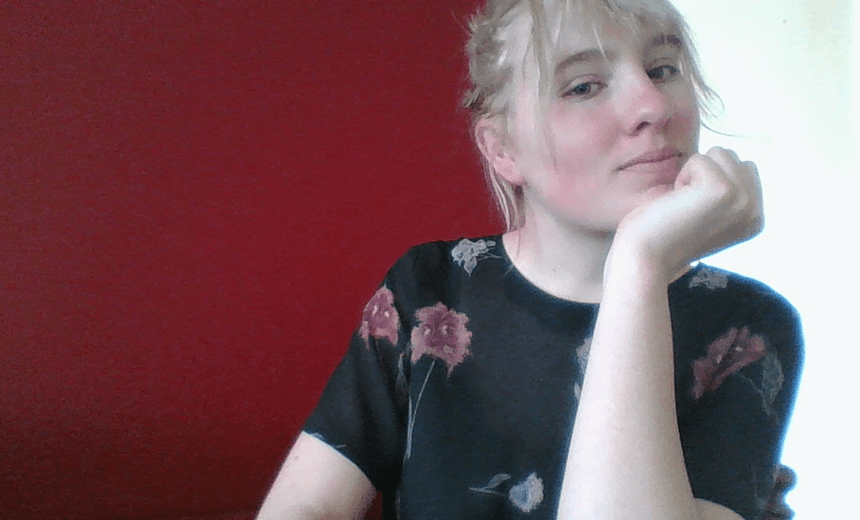Louisa Kasza celebrates the arrival of a “terrifying talent” – Annaleese Jochems, the young author of a novel about an Auckland princess who falls in lust with a gorgeous woman fitness instructor.
Baby, the debut novel from the rudely 23-year-old Annaleese Jochems, signals the arrival of a terrifying talent. It exists in the world of modern Auckland, with its cults of fitness instructors and its inhabitants’ way of seeing the rest of the country as a kind of scenic backdrop to the city.
Cynthia, the warped lens through which we see this already warped world, is a character made fascinating through our microscopic access to her inner life. Superficially a composite of Claudia Hoskins of The Bachelor and every other sheltered-yet-vulnerable Auckland princess, Cynthia is 21 and still very much a kid, and that’s what makes her dangerous. Petite, dyed blonde and pretty (after reinventing herself in unspecified ways from the ugly duckling she had previously felt herself to be), Cynthia is underestimated by older characters in the novel at absolutely everyone’s peril.
She is skilfully drawn by Jochems to be a charming, amusing oddball who speaks her mind with an honesty that is variously endearing and shocking. A lot of Baby’s endless black humour and tension is created through our gradual realisation of the severity of the disconnect between Cynthia’s view of herself and the world versus that of everyone around her.
Cynthia has cobbled together a sense of self from her consumption of reality television shows and the celebrity ‘news’ she constantly consumes via smartphone. Neglected by a moustachioed father who apparently “doesn’t have any contacts in the media industry” (“any more”, is the implication), and never having experienced the love and affection many of us are lucky enough to call normal, Cynthia is consumed by emptiness and has no point of reference for what reciprocal romantic love might look like. All she has is loneliness and lust, which she laser-focuses on Anahera, a gorgeous fitness instructor who has no idea of what’s about to hit her.
Cynthia at first lures Anahera in using the only method she knows – money. When the marriage that appears to be Anahera’s financial foundation collapses, she is drawn to and irrevocably trapped by Cynthia’s offer. In contrast to our complete access to Cynthia’s thoughts and motivations at all times, Anahera’s mind is purposefully only sketched in and we can only view her through the haze of Cynthia’s obsession.
While at first Anahera believes herself to be in control, an adult taking light financial advantage of a besotted playgirl whom she can later ditch, events conspire to bind Cynthia and Anahera ever closer. They take money and other resources that aren’t strictly theirs and leg it to Paihia where they buy Baby, a charmingly run-down boat that will serve as the claustrophobic setting for acts two and three of the novel.
While a great deal of the action takes place in the Bay of Islands, those beautiful and historical surrounds seem to have about as much bearing on proceedings here as the Waitangi Treaty Grounds did on that infamous The Bachelor NZ cocktail party – incidentally the main point of reference our lovely narrator has for Paihia. The outdoor world is of little consequence to Cynthia; only the nooks and crannies of Baby and the landscape of her own mind and body (and Anahera’s body) interest her.
Anahera seems to have some family ties to Paihia. But because Cynthia isn’t interested in anything about Anahera that isn’t also about herself, she doesn’t ask, so we don’t find out. It’s in these kinds of deliberate elisions that we are allowed glimpses at the masterly plotting and characterisation that goes on below the shiny, narcissistically reflective surface of Baby. The novel’s central revelation is that nothing can stand in your way when you have the will, that anything is possible when you love, dream, spend or hate hard enough – until, of course, it isn’t.
The novel’s dreamlike, solipsistic quality at times veers into the surreal, and downright nonsensical. But like Anahera, you’ll have a better time in Cynthia’s strange world if you don’t worry too much about it. Baby is a funny, taut, relentless fever-dream of a novel. Buy it and read it now, and you can brag about it one day the way people who bought and read Emily Perkins’ Not Her Real Name in 1996 do today. Oh, and designer Keely O’Shannessy’s cover, featuring a squished jam-on-white-bread sandwich on a millennial-pink ground, will look good on the shelf, too. In Cynthia, and in Baby, Jochems has created a millennial-pink monster. She should be very proud.
Baby by Annaleese Jochem (Victoria University Press, $30) is available at Unity Books.

